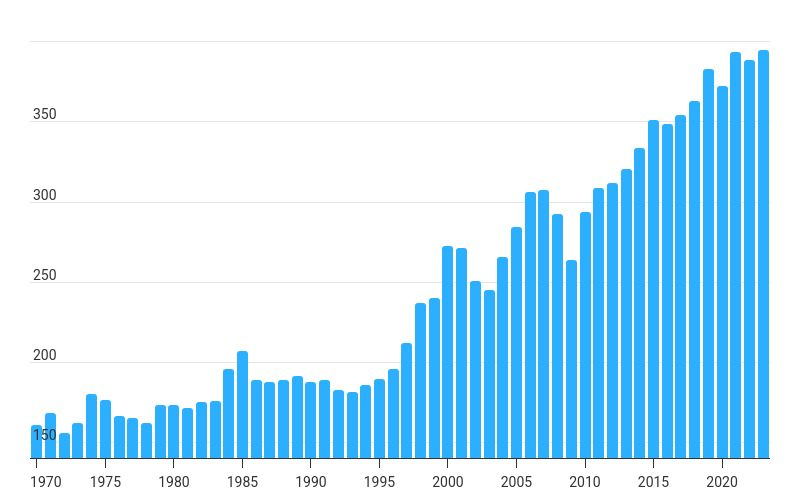Visualize Protectionist Luxembourg
The total territory of the country of Luxembourg is only 988 square miles. Its population is about 666,000 people. And its GDP per-capita is roughly $130,000. That’s about 60% higher than in the U.S. Luxembourg is very close to full free trade, with trade-weighted tariff rates under 2%, and the world’s #1 score for “Trading Across Borders.”
As you would expect given its size and policies, Luxembourg’s economy is based almost entirely on international trade. Its trade share — (Exports + Imports)/GDP — has exceeded 100% for over 50 years.
Luxembourg’s Trade Share: (Exports + Imports)/GDP, in %

In fact, Luxembourg’s exports alone far exceed its GDP.
How is that even possible?
Because Luxembourg massively uses imports to make exports on a massive scale!
If consumption is 50, investment is 30, government purchases are 20, exports are 300, and imports are 250, then GDP=50+30+20+300-250=150, implying that exports are 300/150=200% of GDP. Obvious once you think about it… though I did have to think about it.
Now visualize, if you will, what would happen if Luxembourg suddenly raised tariffs to 25%, 50%, or 100%. I dare anyone to deny the following:
As consumers, the average Luxembourger would suddenly experience massive inflation on virtually everything they buy, leading to a massive drop in their standard of living. After all, the vast majority of what Luxembourgers buy is imported.
As producers, Luxembourgers would see their fabulously successful business model crumble before they eyes. You can’t export without inputs, and you can’t expect a country 988 square miles in size to self-supply more than a few inputs in abundance.
Even if Luxembourg had been running massive trade deficits for centuries, #1 and #2 would still be true. Truly, it wouldn’t change a goddamn thing! Protectionism would still lay waste to this tiny, prosperous, landlocked country. (By the way, based on everything I’ve told you, are you ready to confidently bet on how many years since 1996 that Luxembourg has had a trade deficit? Be honest).
The only halfway decent reply to these three truisms is just: Who cares about Luxembourg?
My answer: Anyone who wants to understand international trade should care about Luxembourg. When you analyze the effect of international trade on a large economy, it’s easy to get distracted by purely domestic factors. Even if Trump’s tariffs all go through, the U.S. will retain most of its great economic strengths, like the tech sector, a long history of entrepreneurship, relatively low labor regulation, and legal fracking. As a result of this continued vitality, American protectionists will avoid crushing ridicule when they loudly claim that their tariffs “worked.”
When you analyze the effect of international trade on a country like Luxembourg, in contrast, domestic factors will not distract you. Nothing in Luxembourg matters nearly as much as the fact that Luxembourg without trade is nothing.
International trade in Luxembourg is not different in kind from international trade in the United States. But the difference in degree is a magnifying glass. Once you see why protectionism would make Luxembourg’s consumers 80% poorer, you see why protectionism would make America’s consumers 10% poorer. Once you see why Luxembourg needs cheap imports to make profitable exports, you see why the same is true around the world. Once you see why trade deficits are a red herring for Luxembourg, you see why they’re a red herring generally.
Luxembourg is probably my favorite country I’ve never visited. It’s not just fabulously rich and beautiful. It is a paragon of peace, a land that has achieved success through the righteous path of cosmopolitan commerce. When was the last time anyone even claimed that it was treating the people of another country unjustly? Luxembourg is the little engine that could.
But to this list of noble contributions, we should add one more: Luxembourg is a living economic lesson to all humanity. Luxembourg shows that international trade is not a terrible threat, but an awesome opportunity. Luxembourg shows that imports are vital for both consumption and production. Luxembourg shows that worrying about trade deficits is, at best, a waste of time. And Luxembourg shows that Nice Countries Finish First. Let us all learn what Luxembourg has to teach us.
P.S. I would be delighted to accept an invitation to visit Luxembourg, praise your country’s wisdom, and offer advice for further improvements. I strongly suspect you need to deregulate construction… Curious? Email me and we’ll work something out.



As someone who lives in Luxembourg, I have enjoyed this place a lot but this article ignores a few key factors.
1. Technically, GDP per capita is that high. However, around half of the working population are cross-border workers who commute daily from Belgium/France/Germany. In other words, half of all workers are not included in "per capita" but still are included in "GDP" measures since they don't live in Luxembourg.
2. Luxembourg, as part of the EU, does not set its own tariff policies. Even if the EU were to increase tariffs, the price differences between Luxembourg and its neighbours are so significant that it would take very high tariffs for indirect effects to be felt here. Even while being part of the EU single market, a lot of residents in Luxembourg drive across the border to do their shopping. (Though gasoline and cigarettes are cheaper here because of lower taxes.)
3. Luxembourg's economy is largely in services, most notably financial (alone approximately 25% of GDP). So the effects of tariffs and the significance of trade deficits are not identical here as they would be even in other European countries like Denmark or neighbouring Belgium or Germany.
4. Luxembourg attracts foreign capital because of its reputation for low corporate taxes. Should other countries copy this, it is unclear that Luxembourg would still have as big of a comparative edge. To some extent, Luxembourg's success relies on other countries having higher taxes. In a fully low tax or no tax environment, Luxembourg would still retain some advantages (low corruption, high quality of life, etc.) but not as much as now.
Life in Luxembourg is mostly great for most people. Though the ability to universalize the lessons of a (very) small state are somewhat limited. Luxembourg does not have a massive domestic market like the United States or China. Meanwhile, the country has had completely free public transport throughout the country (include national railway until the border), which is something Bryan probably would hate.
Bryan, have you ever visited Liechtenstein? Also a small, but rich European country. And even more open to trade than Luxembourg.